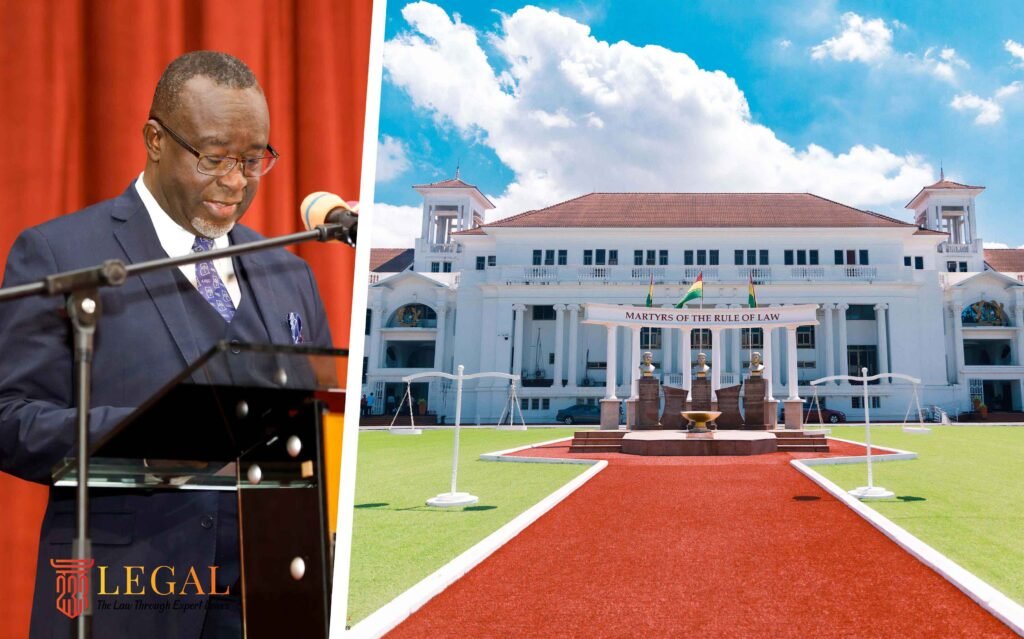
ABSTRACT
The rule, nemo judex in causa sua (no one should be a judge in their own cause), stands as a foundational norm of natural justice, enshrined in both the common law tradition and Ghana’s constitutional framework. Despite its paramount importance, Ghana’s Superior Courts continue to grapple with a troubling practice: Justices adjudicating over contempt cases arising from their own proceedings. This practice fundamentally undermines judicial impartiality by merging the accusatory and adjudicative functions, thereby compromising the integrity of the judicial process.
This paper critically examines the legal and constitutional framework governing contempt proceedings in Ghana, exposing systemic misunderstandings and misapplications. It posits that the conflation of roles constitutes a breach of natural justice and due process. A proper constitutional construction demands the establishment of an institutional firewall that ensures a clear distinction between the citation and adjudication of contempt proceedings, with adjudication delegated to impartial courts of coordinate jurisdiction.
To address these systemic flaws, the paper advocates for comprehensive procedural rules to guide contempt proceedings in Ghana’s superior courts by an amendment to Order 50 of the High Court (Civil Procedures) Rules, 2004 (C.I. 47 as amended), to explicitly prohibit Justices from adjudicating contempt cases linked to their own proceedings. It further recommends the issuance of binding practice directions mandating the automatic reassignment of such cases to neutral Justices. As an interim measure, it proposes that Justices direct their Registrars to reassign contempt cases to sister courts for adjudication by independent Justices. These reforms are imperative to uphold constitutional principles, safeguard judicial impartiality, and restore public confidence in Ghana’s legal system.
Keywords: Nemo judex in causa sua, natural justice, judicial impartiality, contempt proceedings, constitutional safeguards, public confidence, procedural reform, Ghana judiciary.
INTRODUCTION
The rule, nemo judex in causa sua (no one should be a judge in their own cause), is a cornerstone of natural justice, ensuring that judicial proceedings are free from bias, impartiality, and undue influence. This rule is essential for preserving the fairness and integrity of judicial processes. Despite its foundational status, Ghana’s Superior Courts are grappling with a troubling phenomenon: Justices adjudicating contempt cases that arise from their own court proceedings. This practice of judicial overreach undermines public confidence in the judiciary, introducing actual and perceived bias to the judicial process. The absence of procedural safeguards, such as judicial contempt rules of procedure that explicitly bar Justices from adjudicating contempt proceedings emanating from their own courts, and mandating the reassignment of such cases to independent Justices, exacerbates this concern, creating an urgent need for reform to align judicial practices with constitutional guarantees and the rule of law. This paper critically examines the legal framework governing contempt proceedings in Ghana, with particular emphasis on its implications for judicial impartiality and natural justice. It explores the systemic and procedural challenges posed by the current practice of Justices adjudicating contempt cases emanating from their own proceedings and advocates for reforms to explicitly bar Justices from adjudicating contempt proceedings emanating from their own courts, safeguarding judicial integrity.
Section 1 introduces the foundational legal framework for contempt proceedings in Ghana, highlighting constitutional provisions such as Article 126(2) of the 1992 Constitution and procedural rules like Order 50 of the High Court (Civil Procedures) Rules, 2004 (C.I. 47 as amended) (hereinafter referred to as C.I. 47). These laws empower Superior Courts to address contempt swiftly to uphold their authority while safeguarding the integrity of the Judicial system. However, the section critically exposes structural vulnerabilities within this framework, particularly the lack of safeguards against conflicts of interest when Justices adjudicate contempt cases involving their own court proceedings.
Section 2 delves into the recurring issues of misapplying Article 126(2) of the Constitution and Order 50, Rule 2 of C.I. 47. It posits that these provisions are frequently misconstrued to justify practices that contravene the constitutional principles of due process, judicial impartiality, and the rule of natural justice, nemo judex in causa sua (no one ought to be a judge in their own cause). The section further elaborates on the two-phase structure of contempt proceedings, Citing and Adjudicatory, and stresses the constitutional necessity for separating these roles to prevent bias and ensure fairness.
Section 3 analyzes the challenges and implications of the current framework. It discusses conflicts of interest, the risk of actual bias, and the erosion of public confidence in the judiciary when Justices adjudicate contempt cases arising from their own proceedings. The section emphasizes how these practices undermine the foundational tenets of natural justice and Ghana’s legal order.
Section 4 presents recommendations for reform. It proposes legislative amendments to Order 50 of C.I. 47, binding practice directions to ensure impartial adjudication, and interim measures such as referring contempt cases for reassignment to sister courts. These reforms aim to align Ghana’s judicial practices with constitutional norms and the rules of natural justice.
Section 5 presents proposals of legally robust procedures for contempt proceedings, emphasizing their bifurcated nature: the citing phase and the adjudicatory phase. It offers detailed, context-specific recommendations for the High Court, Court of Appeal, and Supreme Court, designed to uphold procedural integrity, impartiality, and the foundational rules of natural justice. The proposals also account for the unique dynamics of coordinate jurisdiction among the Superior Courts, ensuring consistency and judicial propriety at all levels.
The paper concludes that the current practice of Justices adjudicating contempt cases originating from their own proceedings is fundamentally flawed, constituting a breach of the nemo judex in causa sua rule of natural justice, undermining judicial impartiality and public trust, and makes proposals for reforms, comprising legislative amendments, practice directions, and interim measures, which are essential to restoring and preserving the judiciary’s integrity and adherence to the rules of natural justice.
SECTION 1: THE LEGAL FRAMEWORK GOVERNING CONTEMPT IN GHANA
The legal framework regulating contempt proceedings in Ghana reflects the judiciary’s pivotal role in safeguarding the integrity of the judicial process and, by extension, the judiciary, maintaining its authority and safeguarding the rule of law. Anchored in constitutional provisions and procedural rules, this framework empowers Superior Courts to address contempt swiftly, decisively, and impartially.
Article 126(2) of the 1992 Constitution empowers Ghana’s Superior Courts to punish acts of contempt to uphold their authority and integrity. It provides, “The Superior Courts shall be superior courts of record and shall have the power to commit for contempt to themselves and all such powers as were vested in a court of record immediately before the coming into force of this constitution.” This provision underscores the judiciary’s critical role in maintaining the rule of law, but is silent on procedural safeguards to prevent conflicts of interest in adjudicating contempt cases.
Order 50 Rule 2 of C.I. 47 grants Superior Courts summary jurisdiction to address contempt. It provides “Nothing in rule 1 affects the power of the Court to make an order of its own motion against a person to show cause why the person should not be committed for contempt of court.” While designed to ensure swift justice, this rule lacks provisions to address situations where Justices adjudicate cases in which they are directly involved, thereby creating structural vulnerabilities.
SECTION 2: THE RECURRING ISSUE OF MISUNDERSTANDING, AND MISAPPLICATION
The Scope of Article 126(2) of the 1992 Constitution
Article 126(2) of the 1992 Constitution provides that the Superior Courts, as courts of record, “…shall have the power to commit for contempt to themselves and all such powers as were vested in a court of record immediately before the coming into force of this Constitution.”
This provision is frequently misconstrued and erroneously invoked as a basis for Justices adjudicating contempt cases arising from their own proceedings. Such understanding and application, however, contravenes the Constitution’s foundational principles of due process, judicial impartiality, and the prohibition against nemo judex in causa sua (no one should be a judge in their own cause).
A principled reading of the text confirms that the phrase “to themselves” cannot legitimately be construed as authorizing a Justice to adjudicate contempt stemming from their own court. Rather, it signifies the judiciary’s inherent authority to safeguard its institutional integrity by initiating contempt proceedings, while ensuring that adjudication occurs before an independent and impartial court, typically a coordinate or sister court.
This construction aligns with constitutional guarantees of fairness, prevents conflicts of interest, and upholds the rule of law by ensuring that no Justice has a direct or personal stake in the outcome. By referral for reassignment to a neutral forum, Justices preserve both the appearance and reality of impartial justice, reinforcing public confidence in the judiciary, and actually doing justice.
Similarly, Order 50, Rule 2 of C.I. 47 empowers the court to initiate contempt proceedings suo motu (“of its own motion”). Yet, this procedural authority must necessarily operate within the constraints of higher constitutional norms, particularly the inviolable rules of natural justice, which are codified in Articles 19(1) (fair hearing) and 296 (prohibition against arbitrariness) of Ghana’s 1992 Constitution.
Phases of Contempt Proceedings
Contempt proceedings comprise two distinct phases: the Citing Phase and the Adjudicatory Phase.
The Citing Phase involves the initiation of contempt proceedings, typically triggered by conduct that undermines the authority, dignity, or effective administration of justice. It involves initiating quasi criminal proceedings against someone who is alleged to have engaged in behaviour that disrespects, obstructs, or undermines the authority, dignity, or functioning of the court. This phase may be commenced either by the court itself, acting suo motu, or upon application by an interested party alleging contemptuous conduct. The court’s role here is accusatory, focused on identifying potential misconduct, and initiating the procedural mechanisms for a fair trial. This phase requires an objective evaluation of whether the alleged conduct prima facie undermines the court’s authority or interferes with the administration of justice.
The Adjudicatory Phase, by contrast, constitutes the substantive trial of contempt allegations and represents the focal point of due process concerns; the central subject of this paper. The Adjudicatory Phase demands a full and impartial hearing, where evidence is examined, arguments are weighed, and a final determination of culpability or innocence is rendered. The adjudicator in this phase must embody judicial neutrality, free from any prior prejudices or personal stakes in the outcome. This phase is particularly sensitive because contempt proceedings are quasi-criminal, implicating serious consequences for the alleged contemnor, including the payment of fines, potential incarceration or both. It is at this stage that the risk of violating the nemo judex in causa sua rule is most acute.
Given the quasi-criminal nature of contempt proceedings, permitting the same Justice of the court against which the alleged contempt was directed to preside over the adjudication conflates the role of the court. Thus, when the same Justice presides over both phases, the structural safeguards intended to ensure a fair and impartial adjudication are compromised. In effect, the Justice acts as both the accuser and the adjudicator, inherently entangling themselves in a conflict of interest. Such structural conflation is procedurally antithetical and fundamentally incompatible with the rule of natural justice, nemo judex in causa sua.
The current practice under scrutiny is characterized by a deeply problematic procedural anomaly where, in matters emanating from their own courts, Justices preside over both the Citing and Adjudicatory Phases of contempt proceedings.
Although Order 50 of C.I. 47 provides procedural latitude in addressing contempt, constitutional supremacy demands a clear institutional separation between the citing and adjudication of such proceedings. The adjudicative phase, to safeguard fairness and impartiality, must be insulated from potential bias by referring the matter for reassignment to an impartial court. This bifurcation underscores the constitutional commitment to natural justice by ensuring that no party serves as both the accuser and arbiter of a dispute.
The Architecture of Ghana’s Judicial System and Contempt Jurisdiction
Ghana’s judicial system is predicated on the doctrine of Coordinate Jurisdiction; an organogramic principle that vests all Superior Courts on an equivalent hierarchical plane with coequal authority, expressly negating subordination. This framework ensures that no panel or member of a Superior Court on a particular level exercises appellate or supervisory jurisdiction over another panel or member of the court on the same level, thereby preserving institutional parity and safeguarding judicial independence.
Within this framework, Article 126(2) of the Constitution, which grants Superior Courts the authority to commit for contempt “to themselves,” must be properly understood as empowering a Superior Court to cite contempt, whether initiated suo motu or upon an application by an interested party, but to subsequently refer such matters for reassignment for adjudication before another coordinate court. This understanding ensures that the provision is aligned with the foundational rule of nemo judex in causa sua, which categorically prohibits any court or Justice from adjudicating a matter in which they are directly or indirectly implicated.
Construing Article 126(2) as permitting a Superior Court to adjudicate contempt arising from its own proceedings would constitute a fundamental breach of the sacrosanct rule of nemo judex in causa sua. This misconstruction and misapplication effectively transforms the court into both accuser and adjudicator, thereby undermining its role as an impartial arbiter.
The fundamental distinction between the authority to cite contempt and the obligation to adjudicate it impartially is grounded in the rules of natural justice. This dichotomy culminates in a constitutional imperative: no court may preside over a matter in which it is itself a party, thereby safeguarding the integrity of judicial impartiality.A constitutionally sound approach, therefore, requires that contempt matters be adjudicated by an impartial coordinate court; a safeguard embedded in Ghana’s legal order to ensure procedural fairness under Articles 19(1) and 296 of the 1992 Constitution.
Preserving Judicial Integrity Through Proper Contempt Procedures
The proper application of Article 126(2) demands that contempt cases be reassigned to sister or coordinate courts for determination. This separation, between Citing and Adjudication, is not merely procedural but a constitutional necessity, preserving both the reality and perception of judicial impartiality. Allowing Justices to adjudicate contempt proceedings emanating from their own proceedings invites legitimate concerns over bias, thereby damaging public confidence in the judiciary.
SECTION 3: CHALLENGES AND IMPLICATIONS OF THE CURRENT FRAMEWORK
The inherent conflict of interest when Justices adjudicate contempt cases stemming from their own proceedings is a clear violation of natural justice. This dual role compromises the objectivity and impartiality required for fair adjudication. When Justices adjudicate contempt cases emanating from their own proceedings, the likelihood of actual bias increases significantly. This erodes the fairness of proceedings and undermines the constitutional guarantee of impartiality. The judiciary’s perceived impartiality is crucial for maintaining public trust. Judicial overreach in contempt cases risks eroding this trust, leading to broader implications for the rule of law and institutional legitimacy.
SECTION 4: RECOMMENDATIONS FOR REFORM
Legislative Reforms
Amending Order 50 of C.I. 47: The current framework under Order 50 of C.I. 47, which governs contempt proceedings in Ghana, contains a critical gap: the prohibitory gap, which fails to expressly prohibit Justices from adjudicating contempt cases arising from their own court proceedings. This omission creates an untenable conflict of interest, directly contravening the rule of natural justice, nemo judex in causa sua. To rectify this procedural flaw, Order 50 should be amended to explicitly prohibit Justices from adjudicating contempt cases emanating from their own court proceedings.
Practice Directions
Issuing Practice Directions: To institutionalize impartiality and eliminate even the appearance of judicial bias, binding practice directions must be issued to mandate the automatic reassignment of contempt cases to another Justice or panel with no prior involvement in the underlying matter. This measure is not merely administrative but a constitutional imperative, rooted in the principles of due process, judicial neutrality, and the rule against bias (nemo judex in causa sua).
Interim Measures
Referral for reassignment to Coordinate or Sister Courts: Pending comprehensive legislative reforms to clarify contempt adjudication procedures, Superior Court Justices must adopt an interim institutional practice of referring the matter to their Registrars for reassignment to coordinate or sister courts for impartial adjudication. This approach is not merely a procedural formality but a necessary safeguard to preserve the judiciary’s adherence to natural justice, due process, and the rule against bias (nemo judex in causa sua).
SECTION 5: THE WAY FORWARD; PROPOSED LEGALLY SOUND PROCEDURES FOR CONTEMPT PROCEEDINGS
1. High Court
Scenario: Kofi is alleged to have committed contempt against the Tema High Court 1.
Procedure:
- Citing Phase: Tema High Court 1 initiates the contempt proceedings by citing Kofi for contempt, either suo motu or upon an application by an interested party.
- Referral and Reassignment: Following the citation, the matter is referred to the Registrar of the High Court for reassignment to a different court, such as the Tema High Court 2.
- Adjudication Phase: The newly assigned High Court (Tema High Court 2) adjudicates the case. This ensures that the Justice from Tema High Court 1, where the contempt proceedings emanated, is excluded from subsequent proceedings, thereby upholding impartiality and the rule of natural justice.
2. Court of Appeal
Scenario: Yaa is alleged to have committed contempt against a three-member panel of the Court of Appeal in Kumasi.
Procedure:
- Citing Phase: The original panel of the Court of Appeal initiates the contempt proceedings, citing Yaa either suo motu or upon an application by an interested party.
- Referral and Reassignment: The case is referred to the Registrar of the Court of Appeal, who reassigns it to a different panel or a single Justice of the Court of Appeal, excluding the members of the Citing panel, where the contempt proceedings emanated.
- Adjudication Phase: The newly constituted panel or single Justice presides over the adjudication. This ensures that none of the members of the original panel involved in citing Yaa participate in the adjudication, maintaining impartiality, fairness and judicial integrity.
3. Supreme Court
Scenario: Ama is alleged to have committed contempt against a panel of the Supreme Court.
Procedure:
- Citing Phase: The panel of the Supreme Court cites Ama for contempt, either suo motu or upon an application by an interested party.
- Referral and Reassignment: The case is referred to the Registrar of the Supreme Court, who reassigns the case to a different panel or a single Justice of the Supreme Court, ensuring complete exclusion of the members of the Citing panel, where the contempt proceedings emanated.
- Adjudication Phase: The reassigned panel or single Justice of the Supreme Court adjudicates the case. This reassignment ensures that the members of the original panel who cited Ama play no role in the adjudication, thereby preserving impartiality and adherence to the rule of natural justice, nemo judex in causa sua.
This revised framework reinforces procedural integrity across the judicial hierarchy of the Superior Courts, aligning the conduct of contempt proceedings with constitutional principles and safeguarding public confidence in judicial impartiality.
CONCLUSION
The practice of Justices adjudicating contempt cases arising from their own proceedings essentially constitutes a breach of the rule of natural justice, nemo judex in causa sua, undermining public trust in the impartiality of the judiciary. The proposed reforms; legislative amendments, binding practice directions, and interim procedural safeguards, are essential for addressing this systemic flaw.
Aligning Ghana’s contempt adjudication practices with natural justice rules will strengthen judicial accountability and institutional legitimacy, reinforcing the judiciary’s role as a cornerstone of the rule of law. It is imperative that Ghana’s judiciary and policymakers take decisive steps to implement these reforms, ensuring that judicial authority is exercised with impartiality, fairness, and integrity at its fulcrum.
On a lighter note, and with the utmost respect to the esteemed Superior Courts of Ghana, I tread carefully, lest I find myself on the sharp end of a contempt citation, fervently hoping no bailiff arrives with one before lunch. That said, I respectfully posit that we must resist, with every fiber of our judicial dignity, the temptation to moonlight as both judges and parties in our own contempt proceedings, avoiding the alluring but perilous siren call of playing judge, jury, and (let’s be candid) executioner in contempt proceedings.
Even in the absence of explicit procedural edicts etched in stone, the eternal, immutable rule of nemo judex in causa sua; the bastion of natural justice and the guardian of judicial integrity, demands our unwavering allegiance. After all, who watches the watchmen, if not the rule itself? Who better to oversee the guardians of justice than justice itself?











